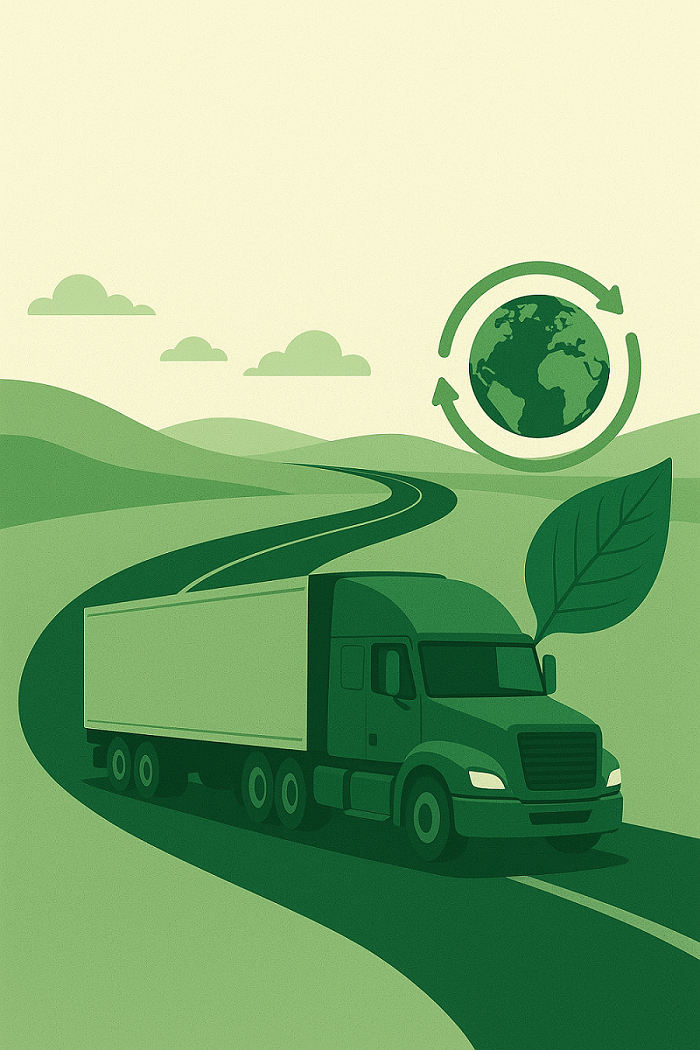The Road to Green Trucking: Why Sustainability Is Now a Business Must-Have
September 8, 2025
Discover why sustainability in trucking is no longer optional. Learn how green practices reduce costs, meet customer demands, and give carriers a competitive edge.

Introduction
The trucking industry has always been the backbone of global commerce, powering supply chains by moving goods from factories to retailers and from warehouses to consumers. Yet, this vital sector now faces growing scrutiny from regulators, businesses, and consumers alike. Rising fuel costs, tighter emission rules, and heightened environmental awareness are reshaping the way trucking companies operate.
At Red Ball Express Logistics, we understand that sustainability is no longer optional—it’s a business imperative. Going green is about more than reducing emissions; it’s about lowering costs, boosting efficiency, and building long-term resilience.
Why Sustainability Matters in Trucking
Sustainability isn’t just an environmental concern; it’s directly tied to business growth and survival in a competitive market. Trucking companies that embrace eco-friendly practices not only reduce their carbon footprint but also gain stronger partnerships, higher operational efficiency, and a better reputation in the industry.
Let’s break down why sustainability has become such a critical driver for logistics today:
1. Regulatory Pressure Is Rising
Governments around the world are pushing stricter emission standards to combat climate change.
-
In the U.S., the EPA’s Clean Trucks Plan requires significant reductions in greenhouse gas emissions from heavy-duty vehicles.
-
In Europe, the EU Green Deal is raising the bar by setting aggressive targets for transport decarbonization.
-
Countries across Asia are also adopting carbon reduction goals, meaning global carriers can’t afford to ignore these shifts.
For trucking companies, compliance is no longer negotiable. Failing to meet regulations can lead to hefty penalties, loss of contracts, and reputational damage. On the other hand, businesses that adopt cleaner fleets early on position themselves as industry leaders and gain a competitive edge.
2. Customers Demand Eco-Friendly Solutions
Sustainability is no longer just a government mandate—it’s a customer expectation.
Modern shippers, especially retailers and e-commerce giants, now require their logistics partners to align with their sustainability goals. For example:
-
Retail chains often demand carbon reporting from carriers.
-
Many global brands have pledged to achieve net-zero emissions in their supply chains within the next decade.
By adopting green trucking practices, carriers can:
-
Win more contracts from eco-conscious shippers.
-
Build trust and loyalty with partners.
-
Differentiate themselves in a crowded logistics market.
At Red Ball Express Logistics, we recognize that sustainability isn’t just about compliance—it’s about securing long-term partnerships by helping our clients meet their green goals.
3. Fuel Costs and Efficiency
Fuel has always been one of the biggest operating costs in trucking. Price fluctuations tied to global markets make budgeting unpredictable and squeeze margins.
Sustainability helps tackle this issue directly:
-
Electric and hybrid trucks drastically cut fuel dependency.
-
Alternative fuels like LNG, biofuels, and hydrogen reduce both costs and emissions.
-
Smart routing and AI-powered logistics reduce empty miles, congestion delays, and fuel wastage.
For carriers, these measures don’t just reduce carbon emissions—they also boost profitability by lowering one of their largest expenses.
4. Competitive Advantage
Sustainability is now a business differentiator.
When shippers evaluate carriers, they don’t just look at pricing and delivery speed—they increasingly demand proof of eco-performance. Companies that can demonstrate measurable reductions in emissions per shipment stand out and often get priority over competitors.
By making sustainability central to operations, trucking companies gain:
-
A reputation as industry leaders.
-
An edge in bidding for contracts.
-
Long-term resilience against rising costs and future regulatory tightening.
In short, sustainability isn’t just good for the planet—it’s good for business.
Practical Steps Toward Green Trucking
Shifting toward sustainability doesn’t happen overnight. But small, consistent actions can deliver significant results. Here are some practical steps every trucking company can take:
-
Invest in Fuel-Efficient Fleets
Upgrade old vehicles with modern engines, hybrids, or fully electric trucks to reduce emissions and long-term fuel costs. -
Adopt Smart Routing Technology
AI-driven systems can optimize delivery routes, minimize idle time, and cut down empty miles. -
Use Alternative Fuels
Biofuels, LNG, and hydrogen-powered trucks are becoming increasingly viable for fleet operators. -
Focus on Preventive Maintenance
Well-maintained trucks not only run longer but also burn less fuel and release fewer emissions. -
Leverage Data Tracking
Monitoring emissions and fuel usage helps identify inefficiencies and improve decision-making.
At Red Ball Express Logistics, we’re already implementing many of these measures to ensure our clients benefit from a supply chain that’s greener, leaner, and future-ready.
The Long-Term Payoff
Sustainability is not just a short-term strategy—it’s a long-term investment in resilience. Green trucking provides multiple benefits:
-
Reduced risk exposure from fuel price volatility and regulatory fines.
-
Improved efficiency through smarter routing and better-maintained fleets.
-
Stronger relationships with shippers who value eco-conscious partners.
-
Future-proof operations in an industry where environmental expectations will only rise.
Companies that commit to sustainability now will not only survive but thrive in the coming years.
Conclusion
The road to green trucking is clear: sustainability is no longer optional—it’s essential for long-term success. For carriers, this shift isn’t just about protecting the planet; it’s about delivering cost savings, operational efficiency, and stronger customer relationships.
At Red Ball Express Logistics, we are committed to building a future where every mile driven contributes to a greener, more sustainable supply chain. By embracing eco-friendly practices today, we’re not only staying ahead of industry demands but also ensuring our partners’ success tomorrow.